In May, we conducted a huge voice of customer analysis on Twitter to gauge users’ opinions over Elon Musk’s takeover of the social media platform. We found that the majority of Tweets are neutral, but the number of Tweets in support of the deal slightly outweighed opposing voices. Although there was some controversy, on balance, the general consensus seemed to be that people were in favour of Musk’s takeover.
However, soon after we published our findings, Musk formalised his withdrawal from the deal. This sparked another huge reaction on Twitter and fertile ground for us to run another analysis. In this blog, we reveal our new findings, and let’s just say, they’re quite different. How has public opinion swayed after the withdrawal of the takeover? Read on to find out.
The Study
We analysed 45665 Tweets in the English language between 1st June and 22nd July 2022.
For our research, we looked at total net sentiment and net sentiment over time as well as key psychographic indicators such as customer loyalty and personality traits.
Timeline of events
Here is a timeline of events pertaining to Musk’s withdrawal that occurred during the timeframe of our analysis:
6th June
Musk warns Twitter he may walk away from the deal if it does not provide additional information regarding spam and fake accounts on its platform, citing this as a material breach of their deal obligations.
8th June
In response, it’s reported that Twitter offers Musk access to its full “firehose” API – essentially a stream of data from 500 million tweets/day. This move is an attempt to end the standoff by providing Musk with a vast amount of data, and bolster Twitter’s case in the event of a court case.
16th June
Musk meets with Twitter employees at a Town Hall event where he states his ambitions for the platform and the company in the event of a takeover. Musk asserts his belief in a strict meritocracy, with free speech being a key priority.
Employees react negatively on Slack, expressing concerns over layoffs, remote work, lack of content moderation and a reduced focus on inclusion and diversity.
21st June-2nd July
Elon Musk falls silent on Twitter having previously averaged 21 Tweets per day. This prompts speculations that he is distracted by other business and personal matters.
8th July
Musk moves to terminate the deal, alleging misrepresentation of user data.
12th July
Twitter files a suit against Musk in an effort to enforce the acquisition deal.
Psychographics
Personality traits
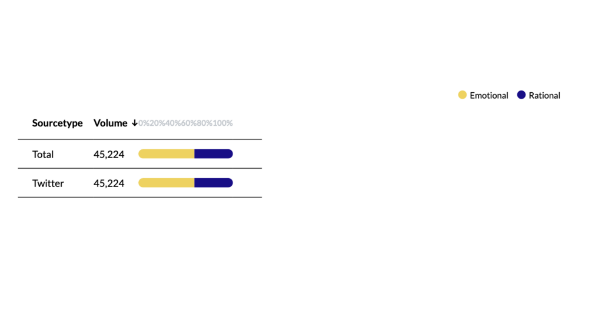
Similar to our previous findings, the majority of Twitter users (~70%) commenting on the issue had an emotional profile, i.e. their feelings (rather than objective facts) drove their opinions as expressed in their Tweets.
Customer loyalty
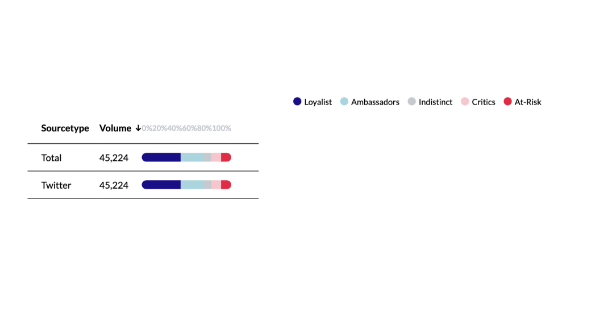
This time around, Twitter loyalists were far more vocal on the issue. Around 50% of users in the study had a high level of brand loyalty, compared to just 24% in our previous study. Twitter ambassadors also comprised a larger proportion of the study, at 30% up from 15% in our May-June study.
What does this mean? Simply put, Twitter users are more passionate about their platform than ever before. It appears that Elon Musk’s withdrawal from the deal has only served to rally Twitter loyalists around their preferred social media platform.
Sentiment
Net sentiment
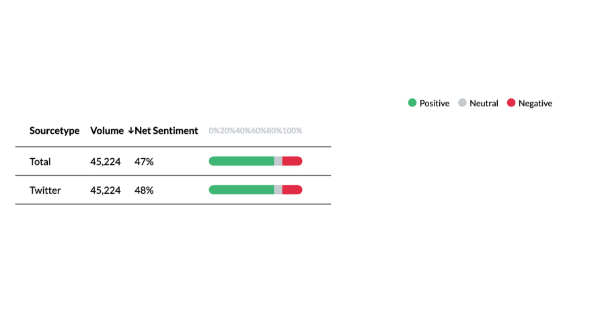
Net sentiment has soared to an impressive +48%, up from +23%. Around 70% of all comments had a positive sentiment and just 8% had a neutral sentiment, this compares to 37% positive sentiment and 51% neutral sentiment in our previous study.
Either fewer people are on the fence in light of Elon Musk’s withdrawal, or Twitter supporters have become more vocal. In either case, our research indicates that public opinion on Twitter has shifted decidedly in favour of the social media platform.
Net sentiment over time
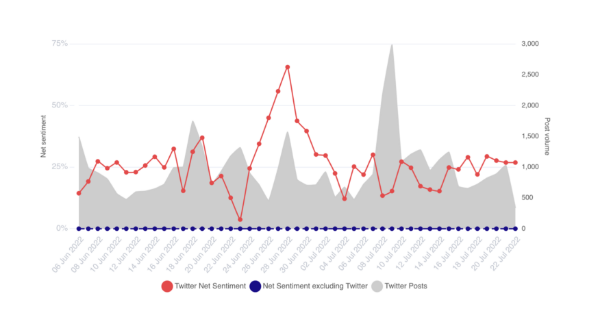
Net sentiment remains consistently positive over the course of the month, with a huge spike in positive sentiment during Elon Musk’s week-long Twitter hiatus. Mentions of the deal soar as Musk announces his withdrawal, and net sentiment dips slightly but soon recovers to pre-withdrawal rates.
It seems that, for the most part, Twitter users were unfazed by Elon Musk’s withdrawal from the deal. Public opinion on Twitter remained positive throughout, with a spike during Musk’s absence. This could indicate that his influence on public opinion is not as great as some may think.
Deep dive: conversations
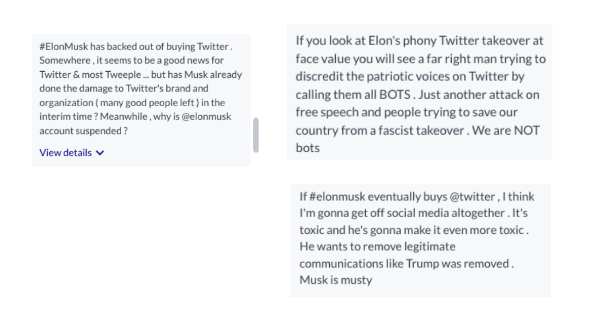
Looking closely at the conversations on Twitter, it’s clear to see that free speech is still a dominating topic. But people are now more explicit in their reasoning.
Insights Summary & Learnings
The new findings show that, in contrast to the previous months in which a purchase of Twitter by Musk was met with neutrality by the Twitter-Community, now there is a
strong support for Musk’s decision not to buy Twitter. In other words: The majority of the
Twitter Community rejects the Twitter takeover.
This conclusion stems from two major developments:
- The context of the topic changed from a potential Twitter takeover to an explicit cancellation of the proposed purchase.
- There is now major positive support for the decision not to takeover Twitter as indicated by Net Sentiment.
The sharp increase in Twitter loyalists also suggests that the platform’s users are more confident in the brand than ever before.
Elon Musk’s potential takeover and subsequent withdrawal has sparked public debate over Twitter’s current handling of free speech, inclusion and diversity. It appears that this has made Twitter users question and reaffirm their loyalty to the platform. Though further investigation would be required to explore other factors (besides the Musk takeover bid) that have swayed public opinion.
Regardless, there has been a significant shift in public opinion since our last study, and it will be interesting to follow how this develops over time.
Public Opinion Research With Symanto
You can run your own public opinion research to help you gauge the sentiment of your customer base or wider community on a topic of your choosing.
We’ll provide you with a detailed report of the net sentiment, volume of mentions, customer loyalty, and more. With these detailed insights, you can make informed, data-based decisions for your business.
Get in touch to try it out for yourself.

